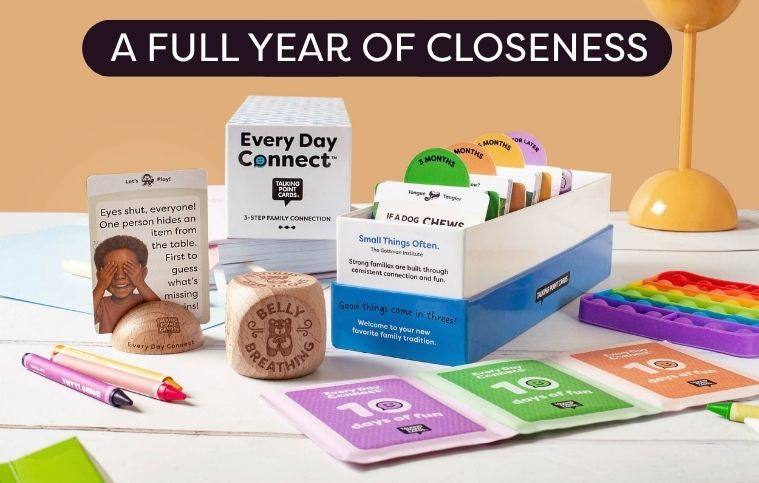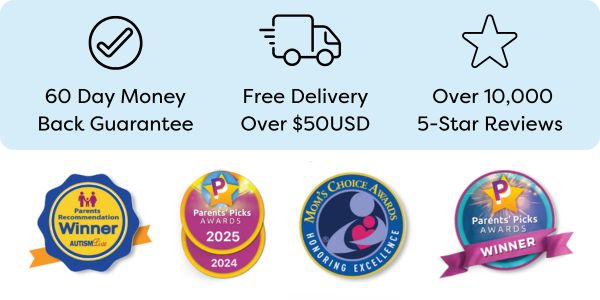SHOP
About
Fostering Innovation Through Open Dialogue
How Talking Point Cards Can Spark New Ideas

In today's fast-paced and ever-evolving business landscape, innovation isn't just a buzzword; it's a necessity. Companies that thrive are the ones that constantly adapt, evolve, and come up with fresh ideas. But here's the thing—innovation doesn’t just happen in a vacuum. It’s a product of the right environment, the right culture, and most importantly, the right kind of communication. And that’s where open dialogue comes in.
The Power of Open Dialogue
Open dialogue is more than just chit-chat. It’s the bedrock of creative collaboration, where ideas flow freely, and everyone feels heard. When team members are encouraged to speak their minds, challenge the status quo, and share their unique perspectives, magic happens. You see, innovation is often the result of diverse ideas coming together, blending, clashing, and ultimately creating something new and exciting. But for this to happen, there needs to be a culture of trust, where people feel safe to express even the craziest ideas without fear of judgment.
Why Open Dialogue Matters
So why is open dialogue so crucial for fostering innovation? For starters, it breaks down silos. In many organizations, departments operate in isolation, with little to no communication between them. This lack of interaction stifles creativity because great ideas often come from cross-pollination between different areas of expertise. Open dialogue encourages collaboration across departments, allowing ideas to be shared, challenged, and refined.

Moreover, open dialogue promotes a sense of ownership and involvement. When team members are actively encouraged to contribute their ideas, they feel more invested in the outcome. This sense of ownership leads to higher motivation, better engagement, and ultimately, more innovative solutions.
But fostering open dialogue isn’t always easy. It requires effort, a change in mindset, and sometimes, a little help. That’s where tools like Talking Point Cards come in.
Enter Talking Point Cards: The Catalyst for Creative Conversations
Talking Point Cards may seem simple, but they’re a powerful tool for sparking meaningful conversations and, by extension, innovation. These cards are designed to encourage open dialogue by providing thought-provoking questions and prompts that get people talking, sharing, and, most importantly, thinking.
How Talking Point Cards Work
Each card in the deck contains a question or prompt related to a specific theme, such as communication, industry, or creativity. The idea is to use these cards during team meetings, brainstorming sessions, or even casual get-togethers to spark conversation and encourage everyone to participate.
For example, a card might ask, "What would a good system of recognition and reward look like in our organization?" or "How can we better leverage our team's unique strengths?" These kinds of questions push people to think critically, question norms, and come up with new ideas that might not have surfaced otherwise.
Breaking Down Barriers
One of the biggest challenges to open dialogue in any team is overcoming the initial awkwardness or hesitation to speak up. This is especially true in hierarchical organizations where junior members might feel intimidated by their more senior colleagues. Talking Point Cards help to level the playing field by providing a structured way for everyone to contribute, regardless of their position within the company.
By using the cards, team members are given permission—almost a mandate—to share their thoughts and ideas. This can be particularly effective in teams where certain voices tend to dominate conversations. The cards ensure that everyone has a chance to be heard, which is crucial for fostering a truly collaborative environment.
Encouraging Diverse Perspectives
Innovation thrives on diversity. The more diverse the perspectives, the richer the ideas. Talking Point Cards are designed to draw out these different perspectives by asking questions that require more than just a yes or no answer. They prompt people to share their unique experiences, insights, and ideas, leading to a more dynamic and creative discussion.
For example, a card might ask, "Should our organization add any new goals this year?" or "Do you believe people have enough on their plates? Too much? Not enough?" These types of questions encourage team members to think outside the box and bring their diverse backgrounds and experiences into the conversation.

The Role of Communication Skills in Innovation
Effective communication is the backbone of any successful team, but it’s especially critical when it comes to innovation. Without clear, open, and honest communication, even the best ideas can get lost in translation, misinterpreted, or simply ignored.
Developing Strong Communication Skills
Using Talking Point Cards regularly can help team members develop stronger communication skills, which in turn, fosters a more innovative environment. By practicing active listening, asking thoughtful questions, and articulating their ideas clearly, team members become better equipped to contribute to the innovation process.
Moreover, the more comfortable people become with sharing their ideas and receiving feedback, the more likely they are to contribute in meaningful ways. This creates a positive feedback loop where open communication leads to more innovation, which leads to even more open communication, and so on.
Building Relationships Through Conversation
Innovation doesn’t happen in a vacuum. It’s the result of collaboration between people who trust and respect each other. Building strong relationships within a team is therefore crucial for fostering innovation, and one of the best ways to build these relationships is through conversation.
Talking Point Cards help teams build stronger relationships by encouraging meaningful conversations that go beyond surface-level small talk. By discussing the kinds of questions posed by the cards, team members get to know each other on a deeper level, which builds trust, rapport, and ultimately, a stronger foundation for collaboration.
Implementing Talking Point Cards in the Workplace
So how can you start using Talking Point Cards to foster innovation in your own workplace? Here are a few practical tips:
1. Incorporate Them into Regular Meetings
Start by incorporating Talking Point Cards into your regular team meetings. Choose a card or two at the beginning of each meeting to kick off the discussion. This sets the tone for open dialogue and gets everyone thinking creatively right from the start.
2. Use Them for Brainstorming Sessions
Talking Point Cards are particularly effective during brainstorming sessions. Use them to prompt new ideas, challenge assumptions, and explore different perspectives. The questions on the cards can serve as a jumping-off point for deeper discussions and help guide the brainstorming process.
3. Encourage Casual Conversations
Innovation doesn’t always happen in formal settings. Sometimes the best ideas come from casual, off-the-cuff conversations. Encourage your team to use Talking Point Cards during breaks, lunches, or other informal gatherings. This helps to keep the conversation going and ensures that innovative thinking becomes a part of your workplace culture.
4. Create a Culture of Continuous Improvement
Finally, make sure that using Talking Point Cards isn’t just a one-time thing. Incorporate them into your workplace culture as a tool for continuous improvement. Regularly using the cards helps to keep the dialogue open, the ideas flowing, and the innovation happening.
Sparking Innovation, One Conversation at a Time
Innovation is the lifeblood of any successful organization, but it doesn’t happen on its own. It’s the result of open dialogue, diverse perspectives, and strong communication skills—all of which can be fostered through the simple act of conversation.
Talking Point Cards provide a powerful tool for sparking these conversations, breaking down barriers, and encouraging everyone to contribute their ideas. By incorporating these cards into your workplace, you can create a culture of innovation that’s built on trust, collaboration, and continuous improvement.
So get talking. Start the conversation. And watch the ideas—and your business—grow.
LIKED THIS ARTICLE?
SIGN UP FOR MORE!







